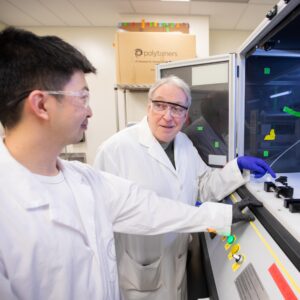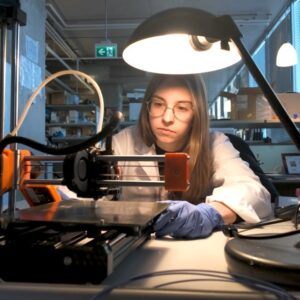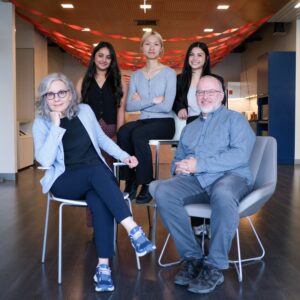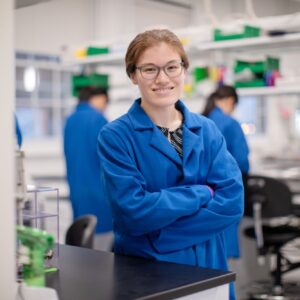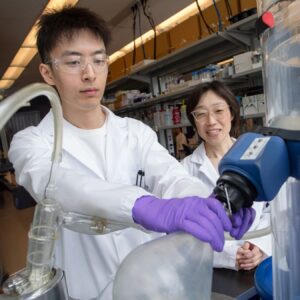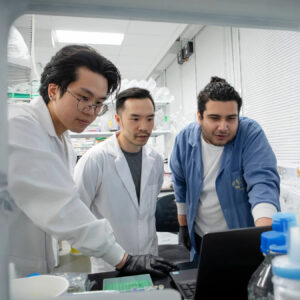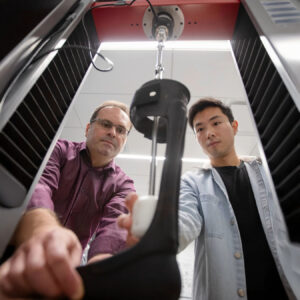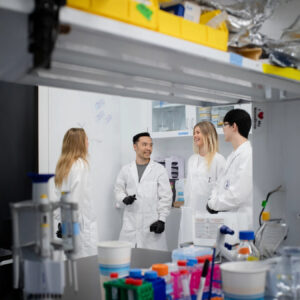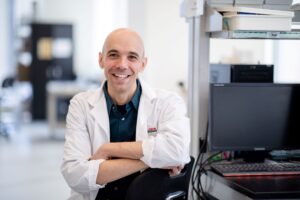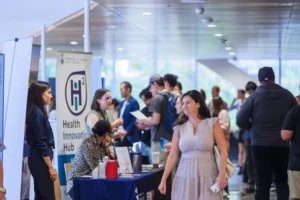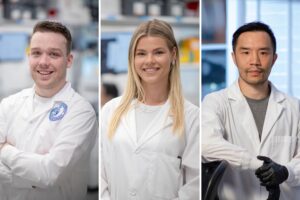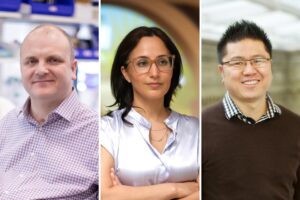Research News and Stories
Explore the latest news, stories, and groundbreaking research happening at the Institute of Biomedical Engineering. Stay updated on innovative projects, impactful discoveries, and the achievements of our talented students, faculty, and alumni shaping the future of biomedical science and engineering.
Quick Navigation
Nine BME affiliated Professors awarded NSERC Discovery Grants
The Discovery Grant program supports researchers exploring new frontiers to address critical challenges, including environmental protection, food security, and sustainable construction in cold climates. It seeks to sustain a diverse and high-quality research ecosystem in the natural sciences and engineering at Canadian universities, foster excellence, and create an engaging environment for research training.
BME Research in Action – Paul Santerre Lab
Discover how Professor Paul Santerre and his team at the University of Toronto are using smart biomaterials to tackle some of today’s most pressing health challenges: from cardiovascular disease and dental repair to bone healing and tissue regeneration.
BME Research in Action – Milica Radisic Lab
From organ-on-a-chip platforms that mimic the heart, kidneys, and vasculature to advanced biomaterials that promote healing and fight inflammation, the Radisic Lab is driving breakthroughs at the intersection of engineering and human health. Their innovations are helping researchers better understand disease, accelerate drug development, and bring regenerative therapies closer to clinical use.
U of T Engineering researchers and startup boutIQ solutions partner to advance heart repair therapies
U of T Engineering researchers and startup boutIQ solutions partner to advance heart repair therapies Professors Craig Simmons and Julie Audet, in collaboration with boutIQ solutions Inc., a University of […]
Caitlin Maikawa wins 2024 John Charles Polanyi Prize
Assistant Professor Caitlin Maikawa of the University of Toronto’s Institute of Biomedical Engineering (BME) has been awarded the 2024 John Charles Polanyi Prize in Chemistry, recognizing her innovative research into biomaterials that could transform the way chronic diseases like inflammatory bowel disease (IBD) are monitored and managed.
BME Research in Action – Professor Margaret Hai-Ling Cheng
Discover how Professor Margaret Hai-Ling Cheng is pushing the boundaries of medical imaging. Her research focuses on non-invasive magnetic resonance imaging (MRI) techniques that go far beyond traditional diagnostics—delving into the cellular, molecular, and physiological levels of the body.
Professor Leo Chou awarded Ontario Early Researcher Award to advance vaccine and immunotherapy delivery
Professor Leo Chou awarded Ontario Early Researcher Award to advance vaccine and immunotherapy delivery Professor Leo Chou has received an Early Researcher Award from the Government of Ontario to support […]
Professor Milica Radisic receives a Governor General’s Innovation Award
Professor Milica Radisic (BME, ChemE) is one of six recipients nationwide of a 2025 Governor General’s Innovation Award. These national awards celebrate exceptional Canadians for their excellence in innovation, and their contributions in helping to shape the future and positively impact quality of life.
BME Research in Action – Professor Jan Andrysek
Discover how Professor Jan Andrysek and the team at the PROPEL Lab are engineering a better future for people with lower-limb impairments. From innovative prosthetic and orthotic devices to developing rehabilitation systems, their research is transforming mobility, balance, and quality of life for individuals around the world.
Engineered cardiac microtissues improve regenerative effectiveness
Engineered cardiac microtissues improve regenerative effectiveness A team of researchers, led by Professor Milica Radisic at the University of Toronto’s Institute of Biomedical Engineering (BME), has developed a new approach […]
BME Research in Action – Professor Leo Chou
At the Institute of Biomedical Engineering (BME) at the University of Toronto, Professor Leo Chou is developing self-assembling molecular technologies to improve disease diagnostics, therapy, and personalized medicine. His team combines DNA nanotechnology, protein engineering, and computational design to create programmable molecular systems with potential applications in cancer immunotherapy and cellular diagnostics.
4 BME faculty members receives Connaught Innovation Awards in 2024-25 cycle
Aereas Aung, Michael Garton, Aaron Wheeler, and Paul Yoo are four of the BME faculty members among eighteen researchers at the University of Toronto are receiving 2024-25 Connaught Innovation Awards in support of their impactful research.
Milica Radisic elected fellow of the American Association for the Advancement of Science
Professor Milica Radisic is one of six recipients nationwide of a 2025 Governor General’s Innovation Award. These national awards celebrate exceptional Canadians for their excellence in innovation, and their contributions in helping to shape the future and positively impact quality of life.
Two U of T Biomedical Engineering Professors Renew Canada Research Chairs
Azadeh Yadollahi (left), a Tier 2 Canada Research Chair in Cardiorespiratory Engineering, and Aaron Wheeler (right), a Tier 1 Canada Research Chair in Microfluidics Bioanalysis, are among 179 researchers across […]
Professor Elaine Biddiss Receives CIHR Grant to Advance Digital Motor Rehabilitation for Children with Disabilities
Professor Elaine Biddiss receives CIHR grant to advance digital motor rehabilitation for children with disabilities Young people with motor disabilities could soon benefit from more accessible and personalized rehabilitation, thanks […]
Professor Jonathan Rocheleau Awarded CIHR Grant to Investigate Key Mechanism in Diabetes Treatment
Professor Jonathan Rocheleau, a researcher at the University Health Network (UHN) and the Institute of Biomedical Engineering (BME), has received a $100,000 grant from the Canadian Institutes of Health Research (CIHR) to explore a crucial aspect of insulin release—a process essential for maintaining healthy blood sugar levels.
Restoration of Rapid Wound Repair Despite Immunosuppressants
Researchers at U of T have determined that immunosuppressants used with transplant recipients slow wound repair by inhibiting the growth of cells adjacent to wounds. They have found ways to restore rapid wound repair in an in vivo animal model.
New drug delivery system could improve glaucoma treatment
Researchers from the Institute of Biomedical Engineering and Chemical Engineering at the University of Toronto have developed a novel method to dramatically extend the duration of glaucoma treatment.
U of T to host new national hub for accelerating life sciences breakthroughs
The University of Toronto and its partners are receiving $4.25 million over the next five years to establish a national hub aimed at accelerating the commercialization of life sciences discoveries.
New study points to leg muscle as a potential early warning system for heart failure
Researchers at the University of Toronto’s Institute of Biomedical Engineering (BME) have found that studying blood flow in leg muscles may help detect cardiovascular disease earlier compared to standardized tests, opening the door to earlier treatment and better outcomes.
Engineering synthetic immune complexes using DNA nanotechnology
Researchers from the Institute of Biomedical Engineering (BME) at the University of Toronto have developed a new method to precisely control the structure and function of immune complexes (ICs) using DNA origami.
Developing biodegradable brain stimulation electrodes for neural repair
Researchers at the Institute of Biomedical Engineering (BME) at the University of Toronto have developed a flexible, biodegradable electrode capable of stimulating neural precursor cells (NPCs) in the brain. This device delivers targeted electrical stimulation for up to seven days before dissolving naturally, eliminating the need for surgical removal.
Three U of T biomedical engineers awarded Canada Research Chairs for innovations in synthetic biology, neurodiversity health, and nanobioengineering
Three faculty members at the University of Toronto’s Institute of Biomedical Engineering (BME) have been awarded Canada Research Chairs (CRCs) by the Canadian Institutes of Health Research (CIHR) and the Natural Sciences and Engineering Research Council (NSERC).
Tissue engineering research earns Professor Alison McGuigan an Arthur B. McDonald Fellowship
Professor Alison McGuigan (ChemE, BME) has earned an Arthur B. McDonald Fellowship from the Natural Sciences and Engineering Research Council (NSERC).

